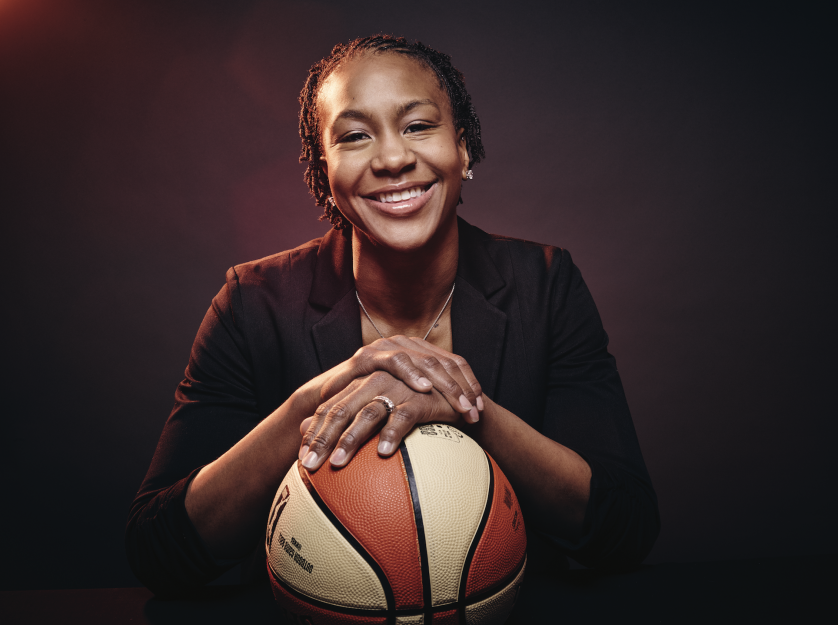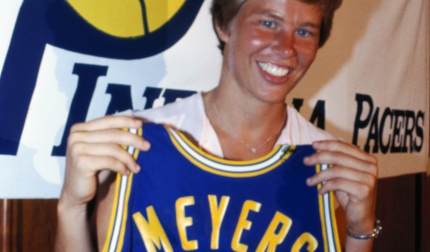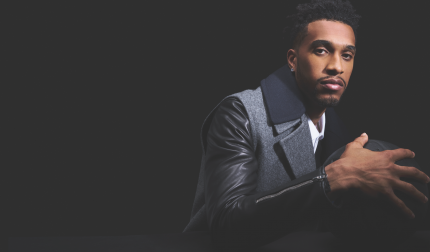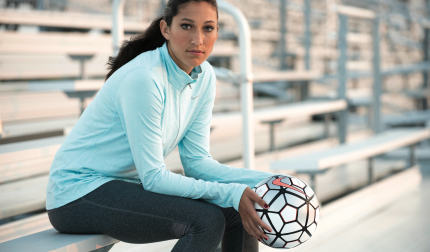This will be your last season as a basketball player. What made you decide to release your autobiography the year before your final season?
It’s been a three-year process to do the book. I didn’t want to rush it. When I decided that I was going to retire in 2016, I decided we should time it to that. The last chapter is about what comes next, and I’m excited about the future.
What inspired the book?
I do a lot of public speaking. After I speak, people always ask, “Do you have a book? Something we can pass on?” The more people asked me about it, the more I became intrigued by the idea. Going through the process, you are reliving your life, going through all of the highs and lows again.
Was there anything in the book that the people closest to you didn’t know?
Well, the chapter about my dad [Harvey Catchings] is unique. It wasn’t like, “Oh, my dad is awful.” Him being a former NBA player, and me following in his footsteps. It was hard. I had to say, “I just want you to be my dad. I don’t want you to be my coach. I want to know that you are there for me to support me and love me no matter what.” I’m hoping that the book is more of an encouragement to other parents who are in that situation to let their kids grow in the game. As a parent, you want the best for your children. I get that. But there is a line between wanting the best for them and pushing them overboard.
One thing I learned from the book is that you and Kobe Bryant were childhood friends.
Our dads played in Italy at the same time. At that age, you’re a kid. You’re with your family, so you don’t think of it much. I had a speech problem and a hearing problem, so my parents didn’t want me to speak Italian. They wanted me to speak English, and once I could do that, everything else we could figure out later. With me and Kobe, they wanted us to be able to grow up like other African-American families and not feel so isolated. Our parents did a really good job; we did a lot of sightseeing and playing together. Our dads weren’t on the same team, so it took some coordinating, but we were kids, so we didn’t think about what the future would hold.
As a child, there was no WNBA yet. What did you want to do?
In seventh grade, I made it my goal to play in the NBA. I was passionate about it. My mom and dad never discouraged me. They said, you can do whatever you want to do. The WNBA started when I was a freshman at Tennessee. Then I watched the ‘96 Olympics with Dawn Staley and Sheryl Swoopes and Lisa Leslie, my idols back then. Right then, I thought that one day, if I could play for the US team, that would be the coolest thing ever. The next year, I made the Junior Olympic team. We were getting ready to leave practice when the door swung open. Then Ruthie Bolton walks in, Lisa Leslie walks in, the whole senior team. Being able to meet them and hang out with them inspired me in so many ways.

By the time you got to the WNBA, what was the environment like?
It was still fresh. The league is 20 years old this year, so we’re still so young. We had the naysayers then. We still have them now! “Why would you want to watch the women over the men?” I was so excited about making it, I didn’t really think about the outside noise. I wanted to do whatever I could to make the league grow.
Not only was it a new league, but a new franchise in Indiana. You must have felt a lot of pressure.
The Indiana team had only been there for a year. I tore my ACL during my senior year in college, and I knew I wasn’t going to play the first year in the league. But there were no stars on our team, so there was some pressure, because everyone was looking at me to lead the team, and I had never been in that position before. I wanted to learn from somebody! I want someone to help me become a professional athlete. But at that time, I was probably the only one ready for a leadership role.
Did you feel like you had to do too much? After all, you’re the only person I know who has had scored a quintuple-double in a game.
I did. I had a lot of conversations with my college coach, Pat Summit. I would call her crying and saying, “I can’t do this!” I had a lot of faith mentors too. My parents, my mom and dad. I put so much pressure on myself to be good, and there was so much pressure put on me.
You were used to pressure. You played on an undefeated team at Tennessee. What’s it like to be on an undefeated team going into the NCAA Tournament?
Pat did a good job making us focus on individual games. We never focused on the end result. The game we are playing is the only one that matters. Having someone like her that could knock us down a bit was important.
In the book, you recall one of your first practices when Coach Summit threatened to send you home for good when you did a defensive drill differently, and that no one had spoken to you that way before. When you’re a female high school athlete, are you treated differently?
I think whether you’re female or male, there’s one thing you don’t realize. My sister and I got touted as the Catchings Sisters in high school. Everywhere we went, we were signing autographs and taking pictures. That was one of the reasons why I moved to Duncanville, Texas with my mom. No one knew who I was there. But when I started playing, they started to figure it out. From a coach’s standpoint, you give your best players a little more leeway. So by the time I got to college, I never had anyone correct me like that. Pat was very specific in how she wanted things done. I was pretty good at defense, and here’s this woman telling me I need to do it differently. Trust me, it was the only time in four years that she ever had to correct me that way. I knew from that moment on, I would never be put in that situation again.
How important was that to you?
You come from high school where you’re one of the top players. Now you’re on a team that’s full of All Americans. You’re not the star that we need to score 30 points anymore. You might play; you might not play. You have to adjust to that. Then you have to adjust going from a top-tier college team to a professional team. You work your way to the top in high school, and you get slammed down in college. Work your way up again, get slammed down in the pros as a rookie. You’re looking for ways to continue to be the best player you can be.

What’s the most important thing about the WNBA to you?
Young female players now have something they can look up to in the WNBA. In twenty years, the girls that created the league are having babies and bringing them to games. And now those kids have something they can aspire to become. The caliber of player we’ll have will become better, with all of these girls working toward it since they were kids.
There must be a sisterhood of players who feel like “We built this!” Can you appreciate what you have collectively achieved?
I don’t think we do as a whole. The older players like Lisa Leslie and Kym Hampton may. The older players get it. It’s a huge part of our future. We started it for 20 years, but now we have to keep it going. My dad played from 1973-1984, I heard his stories about playing way back when, not making any money, and setting the stage for what the game is today. I’m where my dad was, where my daughter will look back the way I look back at my dad, and say, “Wow!” They sacrificed so much to play.
What made you decide that 2016 would be your last pro season?
In 2014, I started having back issues. Every year, the first 10 reporters come out and say, “Is this it? (laughs) Are you done? So I had been getting it for a while. In 2012, I remember Craig Sager asking Diana Taurasi after the 2012 Olympics about the 2016 Olympic team, and she was like, “Yeah, we’re coming back!” And I was like, “Wait! What? We didn’t talk about this!” But after that, it was like, OK, 2016 then. It will be the perfect time to phase out.
So what will this final season be like for you?
We have a lot going on besides the book. I’m not calling it a Farewell Tour; I’m calling it a Legacy Tour. We are going to have postgame parties in every city we play in as a way to say thanks. We had a shoe design contest where we picked 24 different designs. I’ll wear a different design in each city and auction them off at the parties. All the proceeds will go directly to my Catch the Stars Foundation.
What’s the foundation’s mission?
It focuses on fitness, literacy and mentorship for kids. We have reading corners all around Indianapolis. We get people to come in and serve as mentors for the kids. And we get them focused on things like fitness, self esteem, hygiene, how to handle money. We introduce them to yoga and pilates—things they may not have been exposed to before.
So did you and Kobe plan these legacy tours all along?
(Laughs) Isn’t that crazy? My family only stayed in Italy for one year. Their family stayed in Italy for five or six years. We’re back in America. Fast forward to high school. All of a sudden, Kobe is going from high school to the pros. It’s like, wait a minute! Isn’t that the kid we were just playing with? He doesn’t have to go to college? He can go right into the NBA? It’s his 20th year as a pro and my 16th year. It’s weird that things transpired the way they did, but it’s been like a fairy tale ending.
But it’s not an ending. What’s the unwritten last chapter of the book?
After basketball, I want to have a family. I’m passionate about kids, but I’m also passionate about player development. I want to do something that spans the NBA, WNBA, and the D-League. I want to help players get better.
Tamika Catchings' book, Catch a Star: Shining Through Adversity to Become a Champion, is available at amazon.com.





